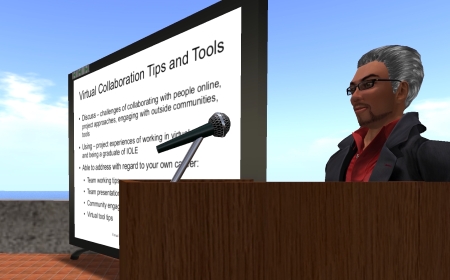
For online collaboration to lead to successful outcomes it is useful to have an understanding of how teams function. We considered the under-lying factors that influence groups and teams in real life and discussed how they might apply in the online environment. Then we examined the various roles different members of the team might play over the life-cycle of a project. You can review Sitearm Madonna’s tips and tools for online virtual collaboration and team working.
John reminded everyone of the importance of reading the project brief carefully and also paying particular attention to the assessment criteria. There is no value in working hard on something that is not required – ensure your focus is sharp and your effort is actually contributing to the required outcome. You should re-read both the brief and the assessment criteria regularly throughout the project to ensure you remain on target.
From here on your blog posts will concentrate on the development of your team and the project, referring to the principles and guidelines outlined in the class. Reflect on how these play out in reality as you work together – describe what works well for you and also the difficulties and problems you encounter and how you resolve them. Pay particular attention to what you are learning, noting how you might do things more efficiently and effectively in any future team work. Ensure you document your contribution to the project.
As there is no formal class next week John advised that you use the time to meet in your groups in SL and get a good start to the project. You all know how difficult it can be to arrange a suitable time to meet outside of class (everyone has lots of commitments) so use this opportunity to kick start your project and settle on a working methodology that suits the members of your team. John will arrange an alternative class time through now the Facebook group.
THINGS TO DO BEFORE THE NEXT CLASS:
- Meet: in your groups to plan your approach to the project, decide on what aspect of the project you will explore, identify the individual tasks and prepare an outline schedule that will see you ready to present your work on May 12th.
- Write the eighth post: to your blog describing this meeting, your contribution and your team plan.
